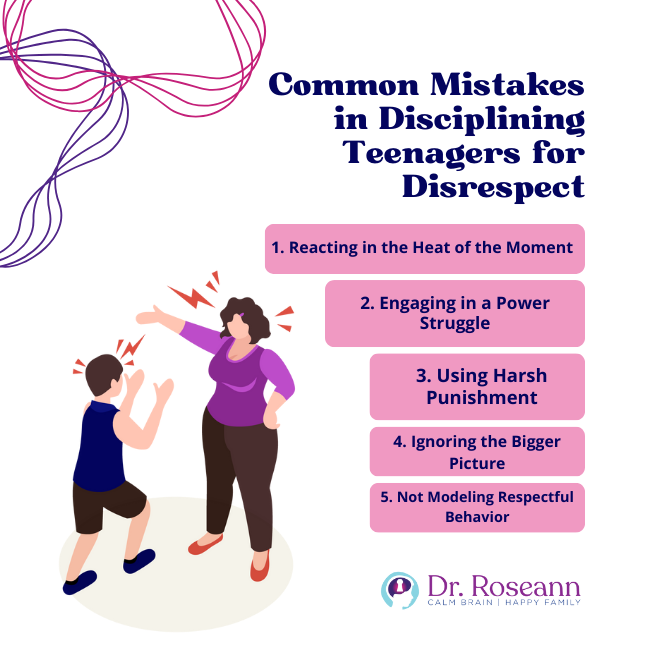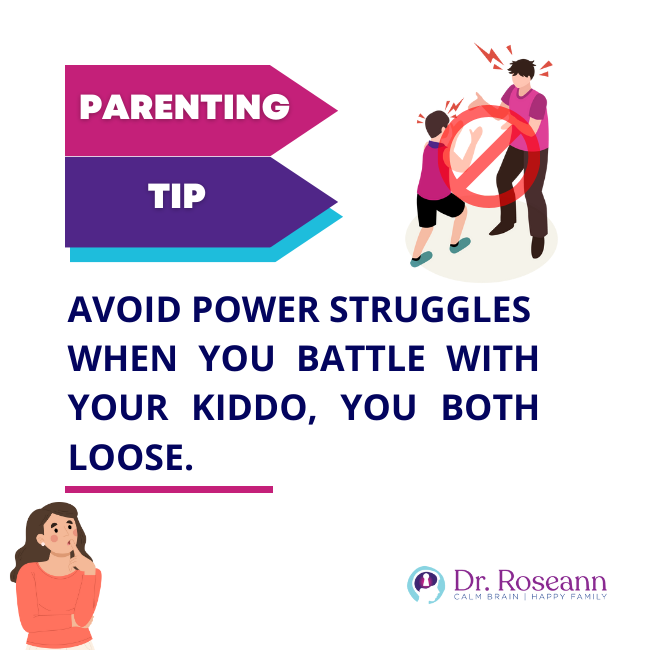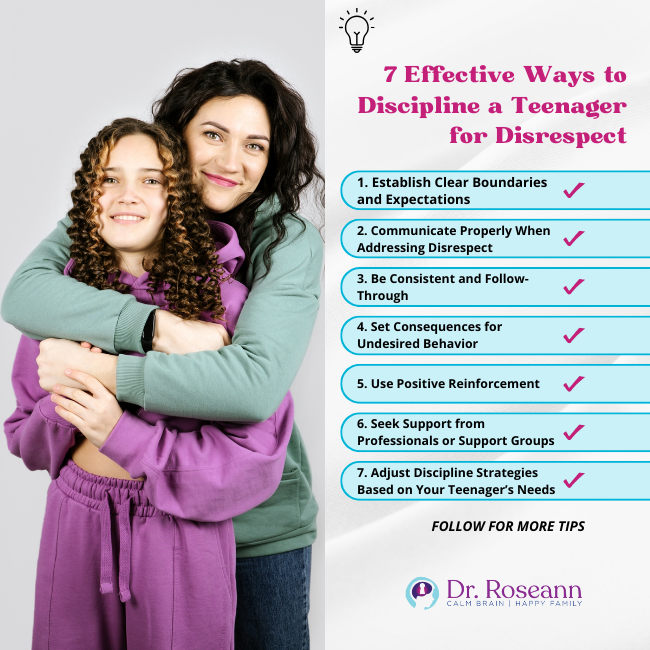How To Discipline A Teenager For Disrespect: Positive Parenting Hacks
When it comes to having teenagers, most parents feel that some level of escalations are part of their day. These developmentally normal situations happen partly because teenagers go through a swirl of hormones, emotions, and newfound independence.
Teens test boundaries because they're not entirely sure where they are. So, before you get frustrated, let’s dig into the nuances of disrespectful behavior during the teen years and why it's as common as teenagers thinking they're too cool for school.
The Importance of Effective Discipline for Disrespectful Behavior
First things first: every parent should learn that discipline isn’t always about punishment. The mantra of effective discipline is to take measures to help teenagers learn and grow. You want discipline that fits the situation, not one that is unreasonable and out of proportion.
Discipline isn't about showing who's boss. It’s about teaching life skills. You're not just laying down the law. You're building a foundation for them to make good decisions and handle life's curveballs with grace.
While a snarky attitude here is and there is perfectly normal for most teens, constant bickering can be a sign of deeper issues or even a clinical problem such as ADHD, mood disorder or anxiety.
Common Mistakes in Disciplining Teenagers for Disrespect

When it comes to disciplining teenagers for disrespect, it's easy to stumble into some common pitfalls. Let's shed some light on each common mistake when addressing rude teen behavior so you can avoid them.
1. Reacting in the Heat of the Moment
If your teenager just rolled their eyes for the umpteenth time, try not to respond immediately. Raising your voice or making a snarky comment because of their eye-rolling won’t help. This is a classic case of reacting in the heat of the moment. Remember that you can’t put out a fire by pouring gasoline on it. Doing this won’t resolve the issue but only escalates the situation.
2. Engaging in a Power Struggle

Teenagers are masters of pushing buttons, and they know well how to push yours. If you engage in a power struggle with them, then you’re getting into a battle you’ll both lose. When you enter this arena, it becomes less about teaching respect and more about proving who's in charge.
3. Using Harsh Punishment
Sometimes, when frustration reaches its peak, parents resort to harsh punishment. But you don’t need a sledgehammer as a gentle tap would often suffice. Harsh punishment may stop the bad behavior temporarily or for the short term. However, research shows that hard punishments rarely lead to long-term positive changes. Instead, it can breed resentment and cause a strained relationship (Alfie Kohn, 2005).
4. Ignoring the Bigger Picture
It's easy to get caught up in the heat of the moment and focus on the specific disrespectful behavior. But it's essential to step back and look at the bigger picture. Is there an underlying issue causing your child’s behavior? Are they dealing with anxiety, peer pressure, stress, or emotional turmoil? Ignoring these factors can prevent you from addressing the root cause of their disrespect.
5. Not Modeling Respectful Behavior
As parents, we often forget that we're the primary role models for our older children. If you find yourself engaging in disrespectful behavior, whether it's towards your teenager or other rude adults, you're setting an example. Your teenager watches and learns from your actions. So, it's crucial to model the respectful behavior you want to see in them.
7 Effective Ways to Discipline a Teenager for Disrespect

Disciplining a disrespectful teenager is a test of patience, empathy, and effective communication. Let’s now explore the best ways to tackle the issue head-on. These parenting hacks will help nurture a respectful parent-teenager relationship while addressing their problem behaviors.
1. Establish Clear Boundaries and Expectations
Here's where we start getting practical. To deal with disrespect effectively, you need clear rules and expectations. You can't expect your teenager to toe the line if they don't know where it is. When you provide clear house rules, it becomes easier for your teen to know what's expected of them. It also reduces the chances of them veering off into the rude behavior lane.
2. Communicate Properly When Addressing Disrespect
Communication is key, even though disrespectful teens seem stone-cold or act like they don't care. Start with taking a deep breath. Then, make eye contact. Engaging in open communication can be challenging, but it's essential for resolving conflicts and building a good parent-child relationship. Remember, communication is a two-way street. Listening is just as crucial as speaking.
3. Be Consistent and Follow-Through
Teenagers may get frustrated if their parents’ discipline is all over the place. When it comes to teen discipline, consistency serves as a guiding star. When you set rules and expectations, make sure you follow through consistently. This will make your consequences more effective and easier for your teen to predict.
4. Set Consequences for Undesired Behavior
When your teen breaks a rule, it's essential to have effective consequences that fit the crime. Natural consequences can be a powerful teacher (Telep, 2009). For example, if they forget their lunch for the third time, they might go hungry for the day, which is a lesson in responsibility. It should teach them to be more mindful of their things the next time. The goal is for them to develop coping skills so they can self-manage uncomfortable experiences.
5. Use Positive Reinforcement
Positive reinforcement techniques encourage teens to do the right thing. Praise and rewards can go a long way. Rewarding good behavior might sound like bribing your teenager, but it's not. Positive reinforcement is about acknowledging and rewarding your teen for making the right choices.
It's crucial to show appreciation when they exhibit respectful behavior, even if it's the little things. Positive reinforcement can help strengthen your parent-child relationship and motivate them to continue making good choices.
One study of positive reinforcement applied in schools shows that when teachers made clear rules, taught students how to solve problems, and praised them when they did well, the students acted better. They stopped being aggressive and disrespectful children. They also tend to pay attention more and finish their work quicker (Gerk et al., 1997).
6. Seek Support from Professionals or Support Groups
If parenting your teenager starts to feel like you are stranded on a deserted island with a handbook written in a language you don't understand, then it's time to seek help from the experts or find your parenting tribe.
If you're feeling overwhelmed, don't hesitate to reach out to mental health professionals or join support groups, take magnesium or incorporate mindfulness-based techniques. You don't have to navigate these rough waters alone. Remember, there's no shame in seeking help when you need it.
7. Adjust Discipline Strategies Based on Your Teenager’s Needs
Every teenager is unique. What works for one may not work for another, so be prepared to adjust your discipline strategies based on your teen's individual needs. Adaptability is crucial when dealing with a teen's behavior. If your teenager responds better to a calm moment of reflection than a heated argument, go for it. Tailor your approach to fit their personality and what motivates them.
Building a respectful relationship with your teenager requires consistent efforts in fostering open communication, setting clear boundaries, and leading by example. It's a dynamic journey where trust and understanding are the bridges that connect the generational gap and enable your teenager to navigate the tumultuous waters of adolescence with your guidance and support. You're not just raising kids. You're raising future adults who will go out into the world.
Remember, you're their role model. Your actions speak louder than your words. So, be the example of calm. Show them what respectful behavior looks like in action. It's a long road, but it's worth it for a lifetime of positive parent-child relationships. It's all about fostering growth and nurturing their mental health and a pill can’t do that! As you modify your parenting style, you'll realize that teenage years aren't so bad, after all.
Parent Action Steps
☐ Maintain your composure, stay calm, and breathe.
☐ Understand the root cause of your teenager's disrespect.
☐ Set clear boundaries.
☐ Foster open and respectful communication with your teenager.
☐ Be consistent
☐ Use natural negative consequences.
☐ Practice positive reinforcement for appropriate behavior.
☐ Seek professional support
☐ Adapt to individual needs.
☐ Be a role model.
☐ Build a good relationship with your teenager.
☐ Download your copy of 147 Therapist-Endorsed Self-Regulation Strategies for Children
Citations
Alfie Kohn. (2005). Unconditional Parenting: Moving from Rewards and Punishments to Love and Reason. Atria Books.
Gerk, B., Obiala, R., & Simmons, A. (1997, May 1). Improving Elementary Student Behavior through the Use of Positive Reinforcement and Discipline Strategies. ERIC. https://eric.ed.gov/?id=ED413044
Telep, V. G. (2009). Discipline for Young Children. Discipline and Punishment: What is the Difference? Vtechworks.lib.vt.edu. https://vtechworks.lib.vt.edu/handle/10919/48306
Always remember… “Calm Brain, Happy Family™”
Disclaimer: This article is not intended to give health advice and it is recommended to consult with a physician before beginning any new wellness regime. *The effectiveness of diagnosis and treatment vary by patient and condition. Dr. Roseann Capanna-Hodge, LLC does not guarantee certain results.
Are you looking for SOLUTIONS for your struggling child or teen?
Dr. Roseann and her team are all about science-backed solutions, so you are in the right place!
Find out more about Dr. Roseann’s first-of-its-kind supplement line, Neurotastic™ Multi-Mag Brain™ Formula to address anxiety symptoms
Empower yourself with natural solutions for your child's mental health and behavior. Download our FREE quick start guide and start supporting your child today.
You can get her books for parents and professionals, including: It’s Gonna Be OK™: Proven Ways to Improve Your Child’s Mental Health, Teletherapy Toolkit™ and Brain Under Attack: A Resource For Parents and Caregivers of Children With PANS, PANDAS, and Autoimmune Encephalopathy.
If you are a business or organization that needs proactive guidance to support employee mental health or an organization looking for a brand representative, check out Dr. Roseann’s professional speaking page to see how we can work together.
Dr. Roseann is a Children’s Mental Health Expert and Therapist who has been featured in/on hundreds of media outlets including, CBS, NBC, FOX News, PIX11 NYC, The New York Times, The Washington Post, Business Insider, USA Today, CNET, Marth Stewart, and PARENTS. FORBES called her, “A thought leader in children’s mental health.”

She is the founder and director of The Global Institute of Children’s Mental Health and Dr. Roseann Capanna-Hodge, LLC. Dr. Roseann is a Board Certified Neurofeedback (BCN) Practitioner, a Board Member of the Northeast Region Biofeedback Society (NRBS), Certified Integrative Mental Health Professional (CIMHP) and an Amen Clinic Certified Brain Health Coach. She is also a member of The International Lyme Disease and Associated Disease Society (ILADS), The American Psychological Association (APA), Anxiety and Depression Association of America (ADAA) National Association of School Psychologists (NASP), International OCD Foundation (IOCDF) International Society for Neurofeedback and Research (ISNR) and The Association of Applied Psychophysiology and Biofeedback (AAPB).
© Roseann-Capanna-Hodge, LLC 2023










